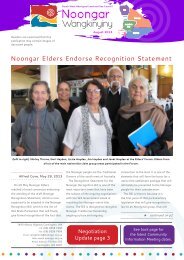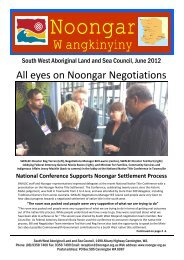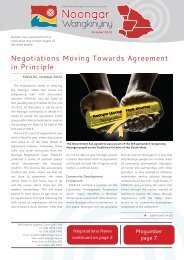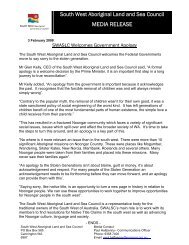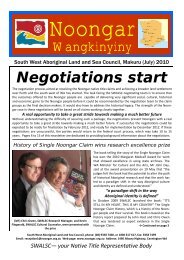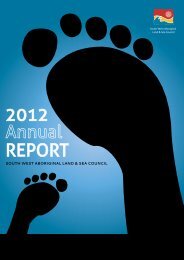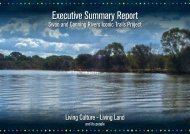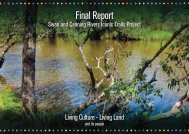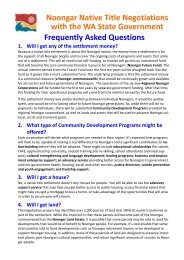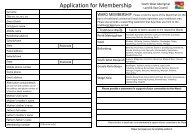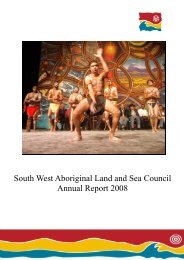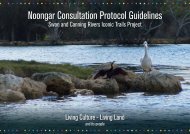Noongar Protocols Booklet - South West Aboriginal Land & Sea ...
Noongar Protocols Booklet - South West Aboriginal Land & Sea ...
Noongar Protocols Booklet - South West Aboriginal Land & Sea ...
- No tags were found...
Create successful ePaper yourself
Turn your PDF publications into a flip-book with our unique Google optimized e-Paper software.
<strong>Noongar</strong> <strong>Protocols</strong>Welcome To CountryRecognising our rights to countryThe <strong>South</strong> <strong>West</strong> <strong>Aboriginal</strong> <strong>Land</strong> and <strong>Sea</strong> Council (SWALSC) is the native title representative bodyof the <strong>Noongar</strong> people, the traditional owners of the <strong>South</strong> <strong>West</strong> of Australia. SWALSC works with<strong>Noongar</strong> people to progress the resolution of <strong>Noongar</strong> native title claims while also advancing andstrengthening <strong>Noongar</strong> culture, language, heritage and society. Since colonisation, for the betterpart of 200 years, <strong>Noongar</strong>s have been trying to regain some of freedom, some sort of dignity,some sort of peace in a world that is irreversibly different from that which came before it. At thesame time though, there are many <strong>Noongar</strong> people who have remained strong, who have beencarriers and custodians of our culture and language, carers of our country, backbones of ourfamilies and advocates of our people.The outcomes of the Single <strong>Noongar</strong> Claim and subsequent negotiations with the Stategovernment during 2009/2010 have seen promising developments appear in the form ofrecognising the rights of <strong>Noongar</strong> people. This is yet another historic opportunity – for the settlerstate to come to terms with the <strong>Noongar</strong> people and for the <strong>Noongar</strong> people to come to termswith today’s world, to secure recognition and rights to traditional lands and to secure a footing intoday’s world which can be used to advance our people and our culture in a way that works today.SWALSC are developing and producing materials and resources to provide a more accurate historyof the south west and the <strong>Noongar</strong> people. There are literally thousands of government recordsdescribing <strong>Noongar</strong> people in negative terms and hundreds of books documenting our apparentdemise. This publication is to assist you in inviting our Elders and <strong>Noongar</strong> people to participate inyour events and give recognition to the first people of the south west region of Australia.We acknowledge our <strong>Noongar</strong> ancestors and the <strong>Noongar</strong> people who have struggled to assertour rights and gain recognition of our people.Glen KellyCEO
Welcometo Countryceremony is anacknowledgmentand recognitionof the rights of<strong>Noongar</strong> peoplestraditional countryThis acknowledgement pays respect to the traditionalcustodians, ancestors and continuing cultural, spiritualand religious practices of <strong>Noongar</strong> people. Further, itprovides an increasing awareness and recognition ofAustralia’s <strong>Aboriginal</strong> peoples and cultures.The Welcome to Country ceremony is anacknowledgment and recognition of the rights of<strong>Noongar</strong> people. The act of getting a representative whohas traditional local links to a particular place, area orregion, is an acknowledgement of respect for traditionalowners. It is respect for people, respect for rights anda respect for country. The land, waterways and culturalsignificant sites are still very important to <strong>Noongar</strong>people. It is an acknowledgement of the past and providea safe passage for visitors and a mark of respect.<strong>Protocols</strong> are the standards of behavior that people useto show respect to each other. Every culture has differentways of communicating, and in order to be able to workwith someone from a different culture in a respectful wayyou need to understand how people from that culturecommunicate.This Protocol Guide has been developed to supportorganisations to help understand <strong>Noongar</strong> protocolsand how to work with <strong>Noongar</strong> people in a way that isrespectful of culture and community.
<strong>Noongar</strong> PeopleThe Traditional Country of the <strong>Noongar</strong> people’scovers the entire south-western portion of <strong>West</strong>ernAustralia. This extends from Leeman in the north-westto beyond Cape Arid in the south-east. Archaeologicalevidence establishes that the <strong>Noongar</strong> people(alternative spellings: Nyungar/Nyoongar/Nyoongah/Nyungah/Nyugah/Yunga) have lived in the area and hadpossession of tracts of land on their country for at least45,000 years. The <strong>Noongar</strong> people (<strong>Noongar</strong> meaning‘person’) are one of the largest <strong>Aboriginal</strong> cultural blocksin Australia. There is no evidence that there has beenany other group than <strong>Noongar</strong> in the <strong>South</strong> <strong>West</strong>.<strong>Noongar</strong> are made up of fourteen different languagegroups (which may be spelt in different ways): Amangu,Yued/Yuat, Whadjuk/Wajuk, Binjareb/Pinjarup, Wardandi,Balardong/Ballardong, Nyakinyaki, Wilman, Ganeang,Bibulmun/Piblemen, Mineng, Goreng and Wudjari andNjunga. Each of these language groups correlates withdifferent geographic areas with ecological distinctions.<strong>Noongar</strong> people speak their own language and havetheir own laws and customs. Those laws and customswere characterised by a strong spiritual connectionto ‘country’; caring for the natural environment andfor places of significance; performing ceremonies andrituals; collecting food by hunting, fishing and gathering;providing education and passing on law and customthrough stories, art, song and dance.Elders May McGuire and Elsie Hume at NationalNative Title Conference Welcome to Country 2008While the effect of European settlement has beenprofound , many significant aspects of <strong>Noongar</strong> Cultureand society have been retained and are still practiced bythe <strong>Noongar</strong> people.
L-R Elders Beverley Port-Louis, Charlie Shaw, Fay Slater, Les Eades, Colin Headland, Theresa Walley, Eric Hayward,Barbara Corbett-Councillor-Stammner, Carol Pettersen, Cheryl Taylor, May McGuire and Peter Phillips <strong>Noongar</strong> Dialogue 2010
Shane Abdullah performing atthe Welcome to Country NationalNative Title Conference 2008
Acknowledgement of CountryAn Acknowledgment of Country is a way thatnon-<strong>Aboriginal</strong> people can show respect for <strong>Noongar</strong>heritage and the ongoing relationship of traditionalowners with the land.The Chair of the meeting, or the principal speakerbegins the meeting by acknowledging that themeeting is taking place in the country of the traditionalowners. Those who acknowledge the country, can‘acknowledge all the traditional owners of the land’ orcan ‘acknowledge the traditional owners of this land’without naming those people.Typical Acknowledgement of Countrystatements can include:• ‘I/We wish to acknowledge the traditional custodiansof the land we are meeting on, the Whadjuk (Perthregion) people. I/We wish to acknowledge andrespect their continuing culture and the contributionthey make to the life of this city and this region;• I/We would like to acknowledge that this meetingis being held on the traditional lands of the<strong>Noongar</strong> people• I/We would like to acknowledge that this meetingis being held on <strong>Aboriginal</strong> land and recognise thestrength, resilience and capacity of <strong>Noongar</strong> peoplein this landContact<strong>South</strong> <strong>West</strong> <strong>Aboriginal</strong><strong>Land</strong> & <strong>Sea</strong> Council1490 Albany HighwayCannington WA 6107Ph: 08 9358 7400Fax: 08 9358 7499
Glossary of TermsEldersElders are our keepers of knowledge in family andcommunity. They are usually Elder people but somefamilies may agree to a younger person to take on thiscultural responsibility. This is the family’s prerogative.SWALSC does not decide who the Elders in ourcommunity are.Trevor Stack Gya NgoopDance Group at SWALSCcelebration of NationalAborigines and Islander Dayof Observance Committee(NAIDOC) July 2007<strong>Noongar</strong><strong>Noongar</strong> language word is a generic and accepted termwhich is used to broadly identify <strong>Aboriginal</strong> people whocome from the <strong>South</strong> <strong>West</strong> region of <strong>West</strong>ern Australia.It is estimated that there are approximately 30,000<strong>Noongar</strong> people living in the south west making thisgroup the largest <strong>Aboriginal</strong> or Torres Strait Islanderpeoples in Australia.Sometimes spelt Noongah, Nyungar, Nyoongar,Nyoongah, Nyungah, Nyugah Yunga.<strong>South</strong> <strong>West</strong> <strong>Aboriginal</strong> <strong>Land</strong> & <strong>Sea</strong> CouncilThe <strong>South</strong> <strong>West</strong> <strong>Aboriginal</strong> <strong>Land</strong> and <strong>Sea</strong> Council isthe native Title representative body of the <strong>Noongar</strong>people, who are the traditional owners of the <strong>South</strong><strong>West</strong> of Australia.SWALSC works with members to progress resolutionof the <strong>Noongar</strong> native title claims, while also advancingand strengthening <strong>Noongar</strong> culture, language, heritageand society.Traditional Owners<strong>Aboriginal</strong> representatives of the traditional languagegroup that inhabited the area prior to Europeansettlement and are recognised as traditional ownersby local <strong>Aboriginal</strong> communities.
Produced by<strong>South</strong> <strong>West</strong> <strong>Aboriginal</strong> <strong>Land</strong> & <strong>Sea</strong> Council<strong>South</strong> <strong>West</strong> <strong>Aboriginal</strong><strong>Land</strong> & <strong>Sea</strong> Council1490 Albany HighwayCannington WA 6107Ph: 08 9358 7400Fax: 08 9358 7499Photographs courtesy SWALSC,Toni Wilkinson, Blackwood Basin Groupand Margaret Owen.Funded by theAustralian Government Department ofFamilies, Housing, Community Servicesand Indigenous Affairs.



